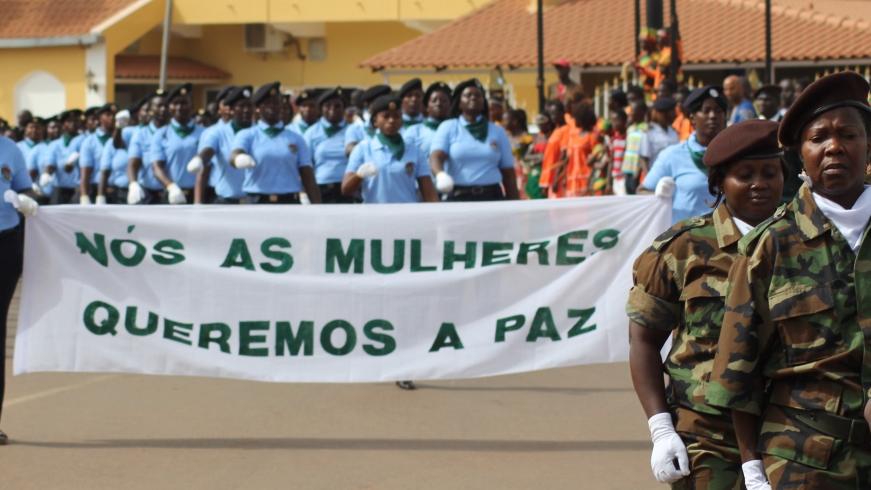The United Nations celebrated on 31 October, the 15th anniversary of the adoption of Security Council Resolution 1325 (2000) on “Women, Peace and Security”. Through Resolution 2242 (2015), adopted unanimously during a high-level debate, the Council called on Member States to increase representation of women at all decision-making levels in national, regional and international institutions and adopt mechanisms for the prevention and resolution of conflict. It also encouraged those supporting peace processes to facilitate women’s meaningful inclusion in negotiating delegations to peace talks, and called upon donor countries to provide financial and technical assistance to women involved in peace processes, including training in mediation, advocacy and technical areas of negotiation.
No passado dia 13 de Outubro, o Conselho de Segurança esteve reunido para rever a Resolução 1325 de 2000, avaliar o progresso aos níveis global, regional e nacional, na sua implementação, e para renovar compromissos e enfrentar quaisquer obstáculos que possam surgir.
Como resultado dessa reunião, o Conselho aprovou por unanimidade a resolução 2242 (2015), em que encoraja os Estados-membros, à luz desta revisão, para avaliarem a estratégias e mobilização de recursos para a implementação da resolução sobre as mulheres, paz e a agenda de segurança, reiterou o seu apelo aos Estados-membros para garantir maior representação das mulheres em todos os níveis de tomada de decisão ao nível de instituições, usando mecanismos nacional, regional e internacional para a prevenção e resolução de conflitos regionais e internacionais. Encorajou também todos aqueles que apoiam os processos da paz facilitarem a inclusão significativa das mulheres nas delegações das partes para as negociações pela paz, exortou os países doadores a fornecerem assistência técnica e financeira para as mulheres envolvidas nesses processos, incluindo a formação nas áreas de mediação, advocacia e em técnicas de negociação.
Ahead of the anniversary, the Council met on 13 October to review Resolution 1325. The main outcome was the issuance of a new resolution - 2242 (2015) - in which it urges Member States, in light of the High-Level Review, to assess strategies and resourcing in the implementation of the women, peace and security agenda, reiterates its call for Member States to ensure increased representation of women at all decision-making levels in national, regional and international institutions and mechanisms for the prevention and resolution of conflict. And it encourages those supporting peace processes to facilitate women’s meaningful inclusion in negotiating parties’ delegations to peace talks, calls upon donor countries to provide financial and technical assistance to women involved in peace processes, including training in mediation, advocacy and technical areas of negotiation, as well as providing support and training to mediators and technical teams on the impact of women’s participation and strategies for women’s effective inclusion, and it further calls on donor countries to provide technical and financial assistance to the women involved in those processes, including training in mediation, advocacy and negotiation methods.
According to the national report on the implementation of the Beijing action platform, even though there is no internal mechanism of protection of women in conflict situations, Guinea-Bissau adopted Resolution 1325 and already has a five years (from 2009) National Action Plan to implement of the Resolution.
According to the head of UNIOGBIS Human Rights Section, Guadalupe de Sousa Reis, the action plan for the implementation of Resolution 1325 in Guinea-Bissau is being followed albeit with some difficulties.
Guadalupe de Sousa Reis noted that the action plan consists of a steering committee led by the Institute of Women and Child and composed of thirty members, including civil society representatives, public and private institutions.
Over the past few years, the UN official explains, were carried out various activities in the implementation of the action plan, among which the awareness of national authorities, particularly the Defense and Security Forces of Resolution 1325 and its importance; the restructuring of the Committee of Women of Defense and Security sector in order to influence the sector reform; the training of the of Defense and Security Forces in the fields of human rights and gender equality. She added that there is an ongoing evaluation process of the state of implementation of the Resolution 1325 Action Plan and also discussions on its possible revision in order to adapt it to new realities.
For her part, IMC’s Executive Secretary for women’s affairs, Eunice Mendes Moreira, said “the Institute, with financial support of development partners, intends to make a diagnosis on the state of implementation of Resolution 1325 in the country”.
The President of the Women's Network for Peace and Security in the ECOWAS space, Elisa Tavares Pinto, said in turn, to have noticed a poor dissemination of Resolution 1325, which makes it difficult to implement. “Women do not know what that Resolution 1325 is about, whether it's an instrument that protects them, that’s why its dissemination is important," she stressed.






